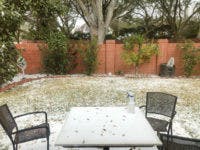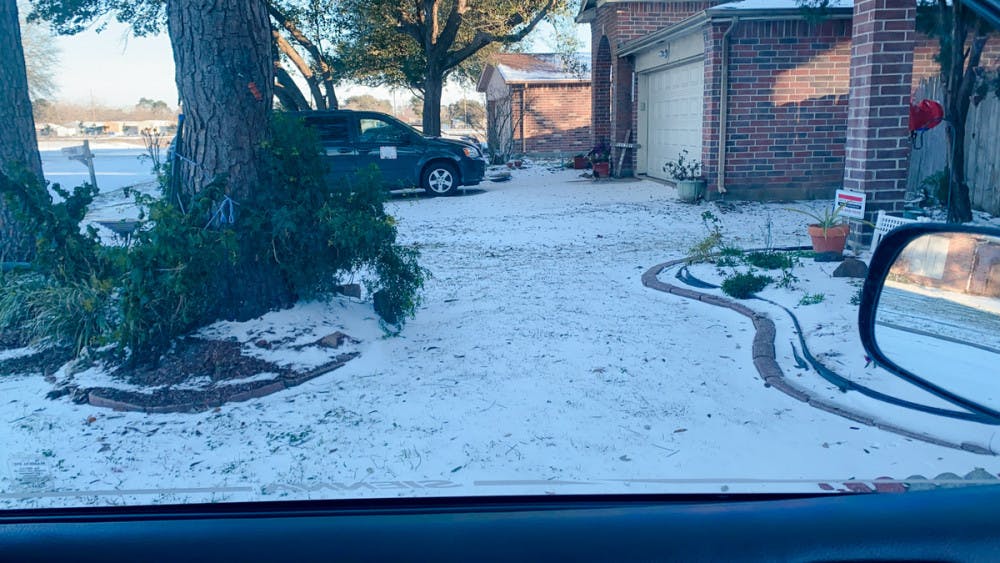Last Tuesday, Marie-Anne Barrón ’22 was eating lunch with her family, grateful to have power again, when she noticed water falling from the ceiling, followed by “a loud boom.”
“All of our pipes burst,” said Barrón, who is a resident of Katy, Texas — a city hit hard by last week’s cold front and state power outages.
The water from the burst pipes in Barrón’s family home leaked from the attic down to the first floor. Barrón said her mother described the scene in their attic as similar to “a Las Vegas water show.”
“You could see it coming out of the air vents. You could see it coming out of the electrical outlets. And that boom we had heard was the bathroom ceiling, which is also our attic floor, caving in,” Barrón said.
Barrón is one of many Brown students impacted by last week’s severe winter storm. Millions in Texas were left freezing, without heat, electricity or running water throughout the week as a result of the state’s power grid failure. At least 80 people have died.

The state’s electrical grid almost collapsed entirely, with many pointing to the deregulated and independent nature of the Texas power system as the cause. The two organizations that oversee the Texas power grid — the Electric Reliability Council of Texas and the Public Utility Commission — are less regulated than power systems in other regions of the country, which tend to have stronger consumer protections and planning for catastrophic events like last week’s storm.
“This was completely human caused,” John Lin ’23 said. Lin, a human biology concentrator studying remotely at home in Houston, lost power and running water last week. “All of this could have been avoidable.”
The storm and blackouts occurred as the state and nation continue to grapple with the COVID-19 pandemic and navigate vaccine rollout.
“It was all pretty chaotic,” Giovanna Milano ’22 said of the storm. Milano, who is studying remotely, lives in McAllen, a city in southern Texas close to the US-Mexico border. “Our grocery stores were emptied. Even fast food restaurants had to close early because they didn't have any more food.”
Because of the power outage, Lin’s family was unable to access their refrigerator and most of their food.
In addition to food shortages, there was also a lack of available gasoline. Milano said that on Wednesday, her father woke up at 5 a.m. to beat long gas station lines, only to find no gasoline left for purchase. “People were really panicking at gas stations,” she said.
Barrón also expressed frustration with the lack of resources and state support available for those impacted by the weather and blackouts.

While the city of Katy has sent out a disaster report to all residents, Barrón said that “there's no guarantee they’re going to do anything” about the fallout of the storm. Barrón, along with her mother and grandparents, is temporarily living with her cousins due to the unsafe conditions of her own home.
Without running water, and given the damages and the freezing temperatures outside, Barrón’s family decided they had to make the move. “This is not sustainable. We cannot live in this house,” she recounted, describing her thoughts as they planned to leave.
Barrón told The Herald she was nervous to stay with her cousins, who are currently attending school in-person. Her grandmother, who is diabetic, and her grandmother’s husband, who was diagnosed with cancer last year, are members of high risk groups for COVID-19.
While the worst is over for some students, Barrón and her family are still suffering the consequences of the storm.
Barrón had been “basically connected to (her) phone” at all times, in the hopes of reaching a plumber. When their house was finally appraised, Barrón’s family was told that since they had left, more of their ceiling had fallen, the drywall had cracked and her garage ceiling was collapsing.
The plumber is “not even going to be able to start working on the house until late next week at the earliest,” she said. Her family cannot return until he starts the repairs, and even then, the house will still retain much of the damage, according to Barrón.
Barrón has received an outpouring of support from her friends and the Brown community at-large. Her sorority, Alpha Chi Omega, has set up a GoFundMe page to help her family cover the costs of the damages.

“I'm literally only going to be able to afford the things that my house needs to be fixed because of the GoFundMe that (Alpha Chi Omega) set up,” Barrón added. “And that's still after draining my savings and my checking accounts.”
Barrón added that her professors have been “super understanding” about her situation.
Despite Barrón’s appreciation of the University’s sympathy and academic support, she has been disappointed by the lack of assistance from the Brown administration with larger challenges that she is facing.
“I need a safe place to live,” she said. “I am temporarily houseless and I don't think Brown has realized that that's the situation I'm in right now.”
Since she has been largely unable to access WiFi, Barrón said her friends have been asking deans for emergency aid on her behalf. But Barrón said that when her friends went to the University, they were told the University could not do more to help Barrón obtain funds for alternative housing due to “legal reasons.”
“I was really hoping Brown would pull through for their (Undocumented, First-Generation College and Low-Income) students,” she said. “Even though individual administrators and individual professors (have been) wonderful, the institution is not really providing the most help.”

Dean of the College Rashid Zia wrote in an email to The Herald that while he could not discuss specific student requests, as it is against federal law protecting student privacy, his colleagues in the College, Student Support Services and the U-FLi Center have been in touch with students and faculty, “encouraging instructor flexibility… and helping to explain how (Emergency Funds, Curricular and Co-curricular Gap) funds may be of assistance.”
“Whether it’s contending with the impact of the weather events in Texas, or for a wide range of other unanticipated events, students are welcome to submit an E-Gap application for any life emergencies that arise,” Zia wrote. “The E-Gap team ... will support (students) in navigating these circumstances.”
The E-Gap system includes supporting students demonstrating “exceptionally high demonstrated financial need” with Life Emergency Funds that cover “urgent and non-academic emergency needs or crisis expenses,” according to the E-Gap application website. The application lists a lack of winter clothing, among other essentials, due to an emergency as a possible reason to apply for the aid.
Zia added that “each and every request is reviewed carefully and supported individually” by the E-Gap team, but not all E-Gap applications can be accepted due to “important federal guidelines that restrict what we can fund.” For instance, expenses already covered by financial aid cannot be funded through E-Gap.
As Barrón and many other Texans have been displaced by last week’s winter storm, questions are being raised about the changes that need to be made to the state’s power system and regulations.
“We're looking forward obviously,” Lin said. “But it's difficult, right? Honestly, I don't even know if (the state will) do much. I hope they do, but I'm not holding onto hope.”
Correction: A previous version of this article incorrectly attributed two photos to Marie-Anne Barrón and John Lin. In fact, they were taken by Giovanna Milano. The Herald regrets the error.





